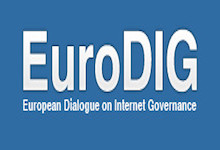Key-note speech of Norway’s Prime Minister Erna Solberg
13 Jul 2017 02:00h
Event report
Norway’s Prime Minister Erna Solberg first congratulated the Estonian government for organising EuroDIG and expressed support for the forthcoming Estonian presidency of the Council of the European Union (EU).
Prime Minister Solberg then presented the opportunities and challenges that the Internet represents for Norway and the world, stating that it had become ‘the most important infrastructure in the world today’. The Internet offers immense opportunities, including in the way people across the world can access education. Some challenges remain, however, in particular in terms of global security and economic stability.
In light of these challenges, how and by whom the Internet is governed is therefore of major importance. It is in the long-term interest of all to have a robust, open, and free Internet. But to do so requires the active engagement of citizens, businesses, and governments. In this context, the Norwegian government attaches great importance to avoiding unnecessary regulation and rules that would be cumbersome for digital activities, while ensuring the safety of citizens against growing cyber-threats.
Prime Minister Solberg then dealt with the role of Internet governance in dealing with current challenges, pointing out that there is no one single global institution governing the Internet. She insisted that the right balance has to be found between what we can do and what we should do. Cyberspace is largely a domain without regulation and it is in the public interest to establish general principles to ensure its sustainability. At international level, Norway actively promotes such principles which consist of supporting the multistakeholder approach, maintaining an Internet with as few regulations as possible, and engaging directly with the business community.
Prime Minister Solberg presented Norway’s efforts to cooperate with other countries to further the digitalisation of both Norwegian and European societies. Digitalisation calls for cooperation at a broader level, given that isolated policy choices could lead to more inequality, less development, and new monopolies. Norway has a progressive agenda aimed at shaping inclusive societies and avoiding the widening of the digital divide. This is why at the political level, Norway has teamed up with Nordic and Baltic countries on these issues. Norway is currently chairing the Nordic-Baltic cooperation and has given to digitalisation a high level of priority. In April 2017, in Oslo, Norway hosted a Nordic-Baltic ministerial conference on digitalisation, during which ministers agreed on a number of common objectives for the coming years. These objectives include supporting digital transformations, establishing a common arena for digital services in the public sector, developing a unique identifying system across borders, and promoting the re-use and free movement of data to support advanced public services.
Digital cooperation between Norway and Estonia also includes projects for the development of 5G networks and the promotion of competitiveness in the digital sector. The strong Estonian-Norwegian cooperation can also be illustrated by the perfect overlap that exists between Norway’s priorities in its chairmanship of the Nordic-Baltic cooperation and Estonia’s priorities as part of its forthcoming Presidency of the Council of the EU.
Nonetheless, the Nordic-Baltic cooperation is not to be meant exclusive. On the contrary, it aims at building a more connected digital Europe. Indeed, Norway is an active participant in the development of the digital single market and intends to learn from other countries’ experiences. Estonia being one of the most advanced e-society in the world, Prime Minister Solberg finally announced she had become from this day an e-resident of Estonia in order to further learn from Estonia’s innovative projects.
Related topics
Related event

